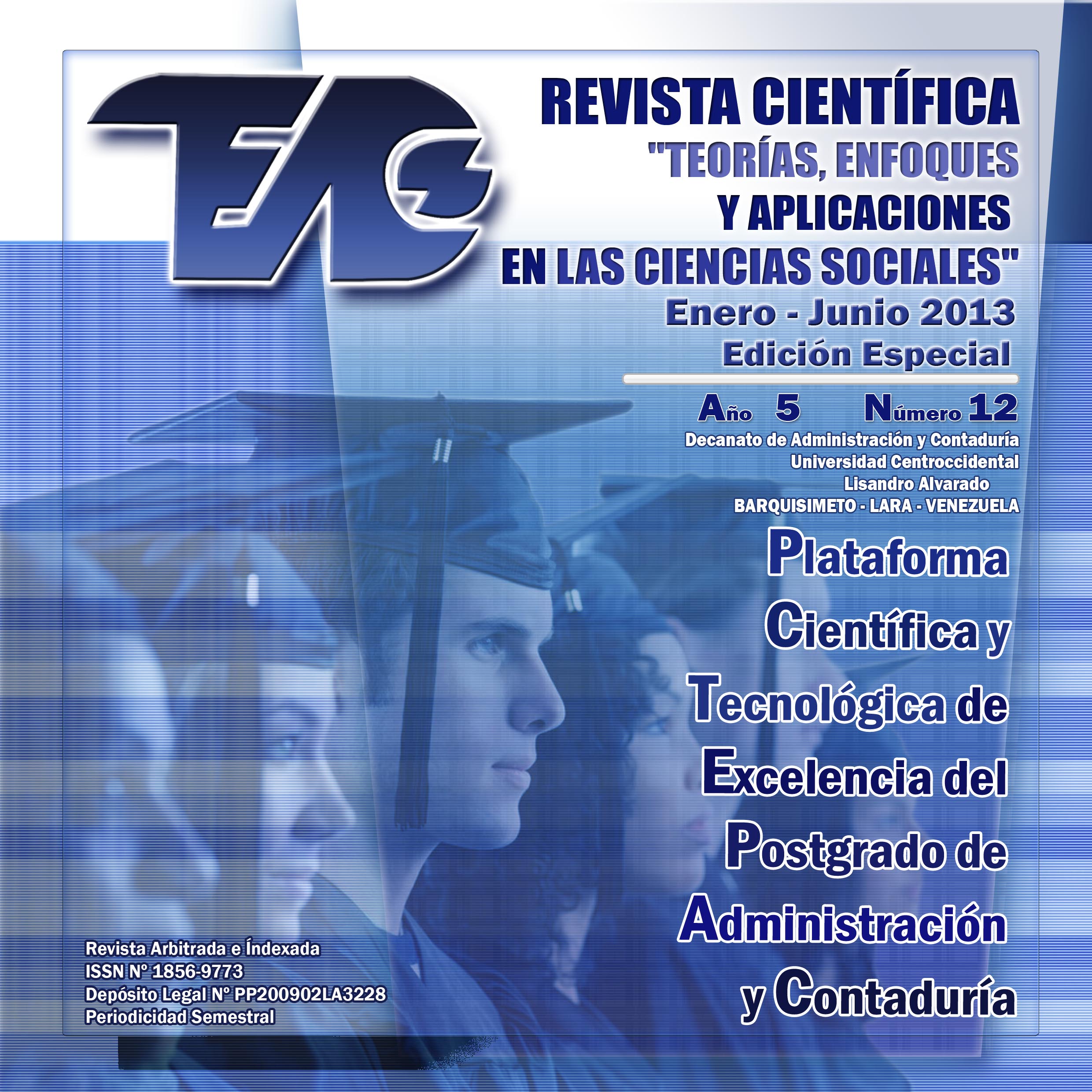The Organizational process in the teacher training college. National experimental university case Guyana Venezuela
Keywords:
academic training, guidelines, modelAbstract
This article summarizes the maim approaches to teacher training experience of academics in the Universidad National Experimental de Guayana (UNEG), with the aim of spreading their progress and contribute to the debate on this issue that in the country is generated. It is divided in to five sections: The first refer to the antecedent, politics and regulations of the UNEG related to de the process of academic formations; The second mentioned preliminary results of the institutional research project: "Facts, Beliefs and Expectation, about the academic UNEG formations", which have contributed to its operationalization The third details the training model: its psychological principles, educational and as well as educational and organizational, core component and process map. The fourth part describes The Integrated Systems of Academic Chase as a support systems form the delivery of training. Finally, in part five reflects some conclusions and the actual situation of the UNEG. The methodological processes inherent to the model come from documental review of others university and those that the UNEG have. Among the findings highlight the benefits that virtual supports have to advance the implementation of the first model designed for teachers in the seven places where the UNEG is located, also the relevance of the principles that govern it and the undertake a deeper educational process on the model, for those with responsibility to its implementation.
Downloads
References
González Maura, Viviana., Rojas Amanda., Canfux, Verónica, (2003) Principios de un programa de formación postgraduada de docentes universitarios para la educación en valores. Ponencia. III Taller Nacional de investigaciones educativas y Educación de Postgrado. MES. 7 y 8 de mayo.
Imbernón, Francisco. (1994). La formación del profesorado. Edit. Paidós. España.
Imbernón, Francisco. y colaboradores. (2002). La Investigación Educativa como Herramienta de Formación del Profesorado. Editorial Grao. Barcelona. España
_______ (2006). Actualidad y nuevos retos de la formación permanente. Revista electrónica de Investigación Educativa RIE, 8 (2). Consultado el día 24-07-08 en http://redie.uabc.mx/vol8nº2/contenido-imbernon.html.
Morín, Edgar.(1999) El Método. La Naturaleza de la Naturaleza. Madrid. Ediciones. Cátedra.
_______. (2001) La Cabeza Bien Puesta. Editorial Nueva Visión. Argentina.
Universidad Nacional Experimental de Guayana (1987).Reglamento de personal académico. UNEG. Venezuela.
________(1996).Reglamento General. UNEG. Venezuela.
_______(2000).Filosofía de Gestión. Dirección de Planificación. UNEG. Venezuela.
_________(2004).Reglamento de personal académico. UNEG. Venezuela
_________(2005).Plan Operativo-Prespuesto por Proyectos. UNEG. Venezuela
__________(2007). Reglamento de Departamentos Académicos. Consejo Universitario. UNEG.Venezuela.
__________(2011). Lineamientos sobre la fase de inducción del personal académico de nuevo ingreso. Consejo Universitario. Resolución CU-O- 02071. UNEG. Venezuela.
_________(2010). Modelo de formación del personal Académico de la Universidad Nacional Experimental de Guayana. Consejo Universitario. Resolución CU-O- 02071. UNEG. Venezuela.
UNESCO (2008) Declaración de la Conferencia Regional de la Educación Superior en América Latina y El Caribe. CRES.
Published
How to Cite
Issue
Section
Derechos del/de autor/es a partir del año de publicación
Esta obra está bajo la licencia:
Creative Commons Reconocimiento-NoComercial-CompartirIgual 4.0 Internacional (CC BY-NC-SA 4.0)
Las opiniones expresadas por los autores no necesariamente reflejan la postura del editor de la publicación ni de la UCLA. Se autoriza la reproducción total o parcial de los textos aquí publicados, siempre y cuando se cite la fuente completa y la dirección electrónica de esta revista. Los autores(as) tienen el derecho de utilizar sus artículos para cualquier propósito siempre y cuando se realice sin fines de lucro. Los autores(as) pueden publicar en internet o cualquier otro medio la versión final aprobada de su trabajo, luego que esta ha sido publicada en esta revista.



